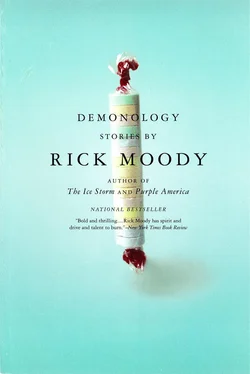$275
Very, Very Unstable In the First Place
12. (Institutionalized Writers) Klingman, Finley. Sun, Shine Down Upon Besieged Humors. Amenia, NY: M.A.O. Press, 1987. A rare peek at the drawings and poems of one of the foremost of American outsider artists, Klingman committed himself in the late seventies upon becoming convinced that computers were beginning to speak to one another, a perception that certainly wouldn’t seem unusual these days. I met him thereafter and found him passionate, articulate, resigned to his fate. He was also an outstanding Scrabble player, specializing in sequences of two- and three-letter words that all fell, mercilessly, on triple-word scores. These feats were accomplished while Finley delivered lengthy tirades about particle physics and Ger man phenomenological thinkers. This chapbook is number thirteen of a limited edition of twenty, signed by Klingman, and thus especially rare, as he believed that signing anything would alert authorities to his political resistance and thereby bring torture down upon his head.
$ 1,000
13. (Institutionalized Writers) Meyers, Mirabelle. County Dreambook. Amenia, NY: M.A.O. Press, 1987. Another in the M.A.O. series. With Meyers’s poetical attention to dismemberment, ecstatic sexual union, forced homosexuality, religious themes, she’d have been a natural for any controversy relating to government funding of the arts, but, astonishingly, her work never came to the attention of Helms, et al., even though she was being housed in a state facility and even though M.A.O. received grants from N.Y.S.C.A. in 1987 and 1988. Meyers’s free-verse poems are all the more astonishing (with their heavy plagiaristic reliance on conservative publications like the National Review, the New York Post, the Washington Times), when you consider that she was a college dropout and former domestic engineer from Corinth, NY, whose husband was the local grocer, and whose children were dyslexic. The author died while incarcerated, penniless and neglected, and this is therefore her only work, one of a numbered twelve copies. I am forced to price it at a threshold it deserves. You would be lucky to have known Mirabelle. Those who did miss her.
$2,500
14. (Institutionalized Writers) Poole, Samuel. In Support of a Reliance Upon Power Tools. Amenia, NY: M.A.O. Press, 1988. Yes, I knew him, too, during that dark interval of my own. I loved them all, my friends inside, they were good people, and it’s no reflection on their own dignity that they didn’t have the kind of insurance that would allow them to stay in private psychiatric hospitals, or that their illnesses were of such sturdy architecture that they could not lead productive lives, as I have been able to do, by finding a line of work that made harmony with who they were, with their gears and engines. One night, I saw Sam Poole, actually floating in the corridor of the hospital; I awoke, in the ward, tiptoed quietly out into the hall, knowing that there was no loneliness like the loneliness of the mentally ill, knowing that my solitude would never be corrected, no matter how many days I waited in front of the brownstone in Back Bay where Anna Feld-man settled with her husband, the tax lawyer. Every thread of my short life had come to a frayed end. Out into the hall I went, across the hall, to whisper at the mesh of the window, out at the county road, empty at that hour but for a tractor, laden with bales, that labored away from me with hazard lamps flashing. I was as astonished as you would be, to find then, Sam, in his dressing gown, unshaven, drifting, as if in a heated, kidney-shaped swimming pool, several feet above the cracked, heaving linoleum. In his sleep, but nonetheless chattering like a suburban housewife. The night orderly was slumped in a chair by the nurse’s station. And thus there was no observer but myself, none but myself to ask of Sam the questions that had afflicted me and others in that institution, but Sam would answer no questions. That was not the sort of oracle he was. Instead, amid his jeremiads were the words Son, you get on out of here now. This is no place for a kid like yourself Since Sam was asleep his remarks were somewhat disordered, but this is how I reconstructed this particular morsel of advice. I founded the M.A.O. Press to preserve Sam’s literary legacy, and, yes, it’s true, Sam Poole argued, while drifting lazily in the corridor of my psychiatric hospital, that no matter the darkness of any life, we should always be grateful for the band saw.
$2,500
A Run of Defaced Mailers
15. Mailer, Norman (Duffy, Tyrone). Advertisements for Myself New York: Random House, 1959. Tyrone Duffy, a graduate of Cooper Union in New York City, began mangling and defacing copies of Norman Mailer’s work in the early eighties, and displaying them in galleries mostly associated with the East Village scene. In interviews, Duffy has refused to acknowledge any particular feeling for Mailer (but how could you have a feeling for Mailer, beyond being appalled that the writer once stabbed his own wife). Duffy claims to have selected Mailer for his art — which incorporates doodles, notations for saxophone solos, grocery lists, bank statements, diary entries, and quarrels with the texts themselves — because the lesser Mailer titles are readily available at used book stores. This subsequent collection of Duffy’s work (as opposed to Mailer’s), amazingly owned by a product manager from the Glock Firearms Corporation (Frank Gilman), is an example of the aleatory quality of all the best literature, how it conjoins reader and writer blessedly, how it is never complete until there is a reader who can make of the work what she or he wishes, using it to line their birdcage, using it for ecstasy or articulation of dreams, using it to imagine their own log cabin in the empty forested regions of Western Canada or Cincinnati skyscraper in the shape of a flamingo; all this collecting of the perfect copy of everyone’s book, you and I know that collection is merely autobiography. Mailer now becomes Tyrone Duffy, and while Mailer might still haunt the Promenade on Brooklyn Heights, walking a pug and smoking a cigar, Duffy’s Mailer crowds him out. Late at night the author senses it and trembles.
$750
16. Mailer, Norman (Duffy, Tyrone). Tough Guys Don’t Dance. New York: Random House, 1983.
$500
17. Mailer, Norman (Duffy, Tyrone). Ancient Evenings. Boston: Little, Brown, 1983.1 should admit that I am a great appreciator of spines of the book, their simple elegant signs of authority. I like the multifary of jackets, I like the simple three-color jackets of an earlier time in the century, I like the type jackets of Salinger, I like the jackets of Gallimard and all French publishers. But as for books themselves, I care minimally; I didn’t even open most of the books you see on this list, it’s true. Opening them would damage the spine. But I did, however, at a certain time in my life, read the opening pages of Ancient Evenings. I have no idea how the rest of the book turned out, but the opening was among the most beautiful things I’ve ever read, and I can tell you exactly where I was when I read this opening; it was during my Cambridge experience, before the arrest, and I was working in the secondhand bookstore and going home at night to an apartment I shared with a guy called Reginald, at which point I would hit the lush hard and then climb up on the roof of the apartment building (a three-story townhouse sort of a thing), as if it were the roof of the world. It was there one night I was reading the opening of Ancient Evenings by flashlight when who should go past, down below, on the verdant Cambridge street where I lived, but Anna Feldman, like a specter from a future I would never have. I called to her, Anna! Hey, Anna! Its me, up here on the roof! I’m up here! Was it a harbinger of my decline that there was an unmistakable hastening away of her footstep at the sound of my voice? Did I imagine it? Or was I my own adversary, and she just my catalytic muse? I threw the book after her, from the roof, its leaves, its boards, like wings flapping, flight less, tumbling, foliating, to earth, in the little area beside my neighbor’s recycling cans, If I can’t have you, I believe I shouted, I’ll have nobody, I’ll be noteworthy for my absence, for recoiling! I will make a temple to your unattainability! I will worship there! I will charge exorbitant fees to the members of my congregation! I will found a mystery cult! I will become a preacher!
Читать дальше












